Key takeaways:
- Understanding and communicating about STIs and their prevention is crucial for personal and partner health.
- Regular STI testing empowers individuals to make informed decisions and fosters open communication in relationships.
- Lifestyle changes, including exercise, nutrition, and stress reduction, significantly improve overall health and enhance the body’s ability to prevent infections.
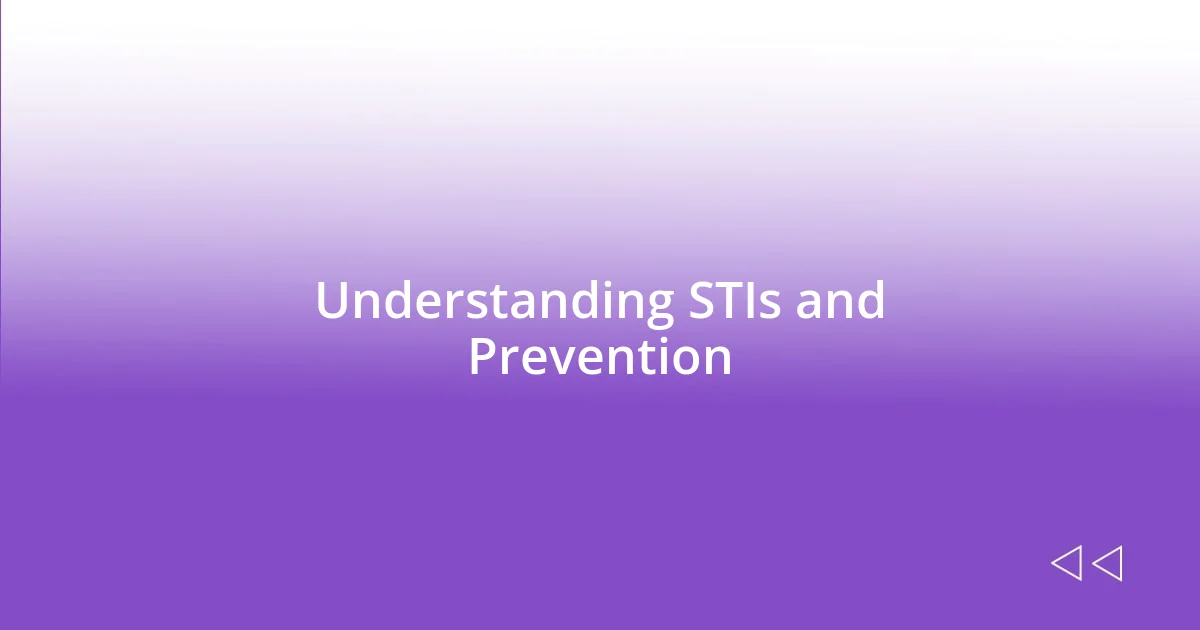
Understanding STIs and Prevention
STIs, or sexually transmitted infections, can often feel overwhelming to think about, but understanding them is the first step in prevention. I remember my own feelings of anxiety the first time I read about the wide variety of STIs and how easy they can spread. It really hit me—what if I didn’t know, or worse, what if I mistakenly put myself at risk? This curiosity pushed me to learn more and share that knowledge with others.
Prevention strategies are crucial, and they can vary greatly depending on individual circumstances. For instance, I always found that regular check-ups and open conversations with my partner were vital in my approach. Have you ever felt embarrassed discussing STIs? I know I did initially, but that vulnerability can actually lead to stronger connections and better health outcomes.
Using protection, such as condoms, is another essential tactic. I used to think, “Will this really make a difference?” But knowing that it reduces the risk of many STIs significantly changed my perspective. The peace of mind that comes with taking these steps is priceless, and it empowers us to take control of our sexual health.
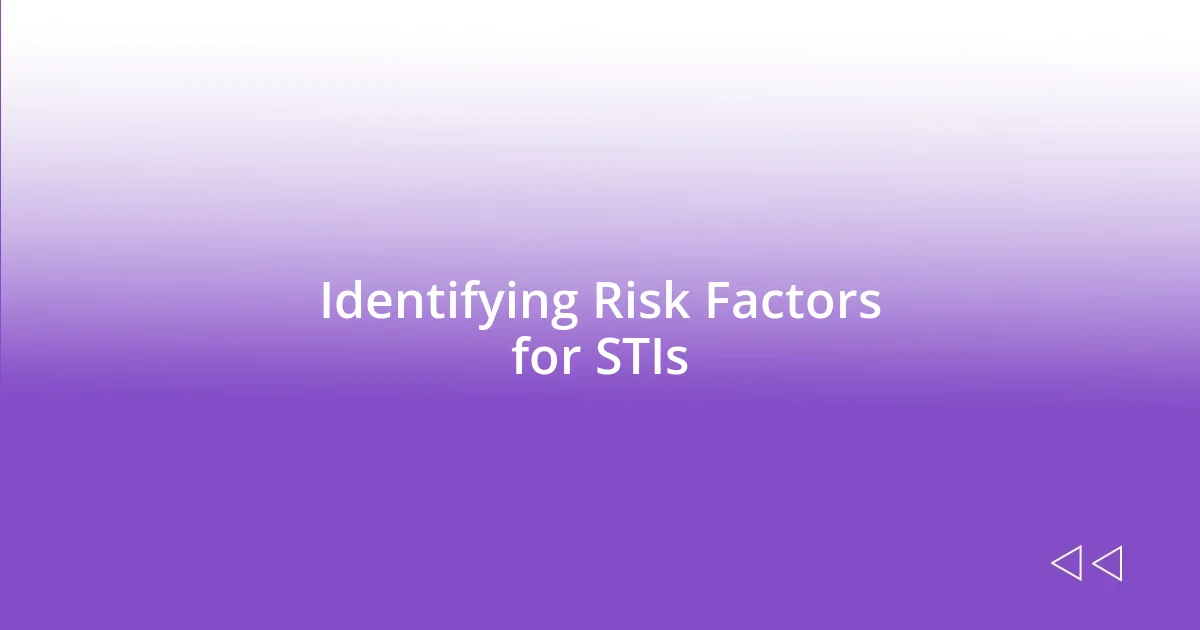
Identifying Risk Factors for STIs
Understanding the risk factors for STIs has been an eye-opening part of my journey. I remember attending a health seminar where the speaker emphasized that certain behaviors and situations significantly increase the likelihood of infection. That really resonated with me because it highlighted the importance of being aware of my own actions and choices.
Here’s a breakdown of key risk factors to consider:
- Multiple sexual partners: The more partners you have, the higher your risk of exposure. I once had a fling without fully considering this, and it made me rethink my choices.
- Unprotected sex: Not using condoms during sexual activities is a leading cause of STI transmission. The moment I realized their importance marked a turning point for me.
- Substance use: Alcohol or drug use can impair judgment, leading to risky sexual behavior that I’ve seen many friends fall into. It’s crucial to stay clear-headed.
- Lack of regular testing: Not getting tested can be dangerous, as many STIs are asymptomatic. I started making testing a routine part of my health check-ups, which gave me a tremendous peace of mind.
- Inconsistent communication with partners: Not discussing sexual health openly can lead to misunderstandings. I learned that these conversations could be awkward but were vital for my wellbeing.
Recognizing these factors and my own experiences allowed me to take proactive steps, making my sexual health a priority. It’s liberating when you understand the landscape of risks and can navigate it with informed choices.
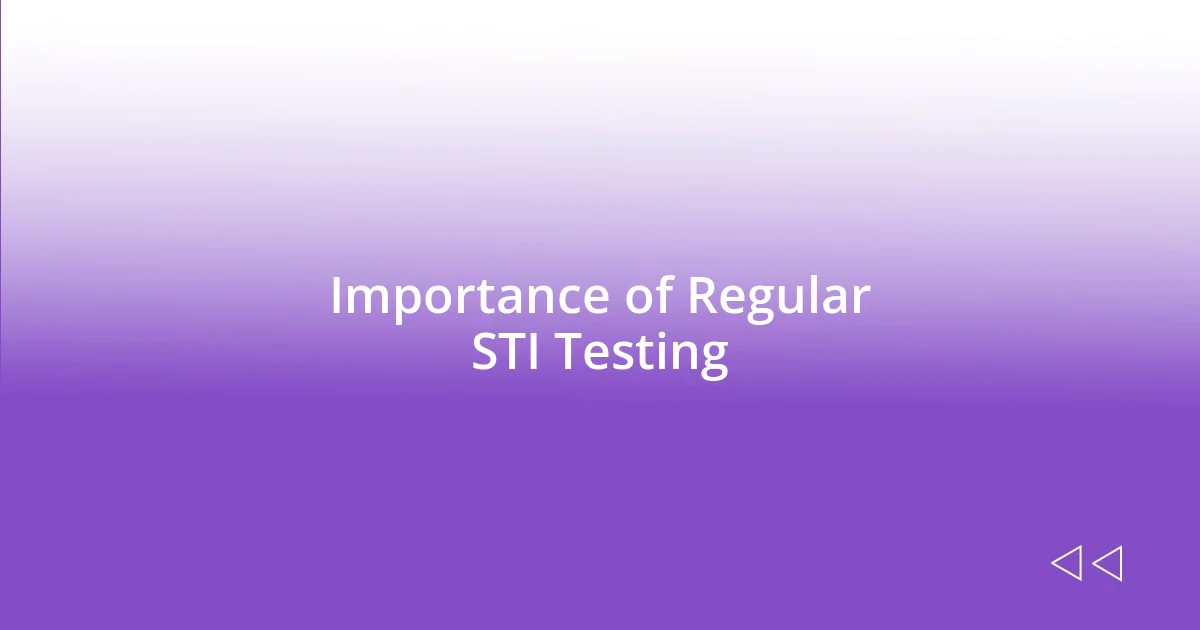
Importance of Regular STI Testing
Regular STI testing is an essential aspect of maintaining sexual health, and I can’t stress enough how important it has been for my peace of mind. I remember the first time I went for testing; I was anxious, but once I got the results, it felt like a weight lifted off my shoulders. Knowing my status empowered me to make informed decisions in my relationships. It’s astonishing how many people are asymptomatic, which is another reason I believe everyone should prioritize regular testing.
Another aspect worth mentioning is that STI testing opens up opportunities for healthy conversations with partners. I’ve found that discussing testing with my significant other not only strengthens our relationship but also builds trust. Have you ever hesitated to bring up the topic? I used to think it would be awkward, but that moment of vulnerability led to richer, more open discussions. It’s a shared responsibility, and I’ve learned that openness can lead to better health outcomes for both partners.
Lastly, I view regular testing as a proactive measure that takes control of my sexual health. It’s something I integrated into my routine check-ups, along with my yearly physical exam. Just like how I wouldn’t skip my annual dentist visit, I see STI testing in the same light. It’s not just about preventing infections—it’s about embracing my sexual health as an integral part of my overall wellbeing. I genuinely believe that when we prioritize testing, we empower ourselves to lead healthier lives.
| Aspect | Importance |
|---|---|
| Peace of Mind | Regular testing eases anxiety about one’s sexual health status. |
| Open Communication | Encourages vital conversations with partners, fostering trust and understanding. |
| Proactive Health Measure | Treats sexual health as a priority, akin to other routine health checks. |

Effective Use of Condoms
Using condoms effectively has always been a cornerstone of my approach to sexual health. I remember a time when a friend casually mentioned how they sometimes skip condoms, thinking it wouldn’t be a big deal. My heart sank at the thought, as I recalled how crucial it is to use latex or polyurethane protection correctly. The very act of unrolling that barrier properly can indeed make a significant difference in STI prevention. Just like following a recipe, paying attention to the details is vital for a safe and enjoyable experience.
It’s not just about grabbing a condom from the drawer; I’ve learned that checking the expiration date is equally important. I once discovered an old box tucked away, and it made me realize how often we might overlook this detail. Using expired condoms can jeopardize their efficacy, and let’s face it, we want to feel secure in our choices. By treating my condoms with care—choosing the right size and type for me and my partner—I ensure we’re both protected. Have you ever felt the difference between a good quality condom versus a cheap one? That distinction matters for both pleasure and safety.
Another tip that has transformed my perspective on condom use is applying water-based or silicone-based lubricant. Early on, I hesitated, thinking they might reduce the effectiveness. But once I tried it, the whole experience changed for the better. It enhances comfort and reduces breakage risk, keeping worries at bay. I would encourage anyone to explore this and find what works best for their needs. Trust me, the right lubricant can take things to a whole new level, enriching intimate moments while making safety a fun part of the equation.

Communication with Partners
When it comes to communication with partners, I’ve learned that honesty is crucial. I recall a moment where I nervously confessed to my partner about my past experiences with STIs. It was a tense moment, and I felt vulnerable, but the conversation opened a door to deeper understanding. Have you ever shared something that felt daunting, only to realize it strengthened your bond? That’s precisely what happened for us, allowing us to discuss boundaries and our mutual responsibilities.
During these conversations, it’s essential to create a safe space where both partners can express their concerns. I remember sitting down with my partner after reading an article on STIs, wanting to share my newfound knowledge. We not only talked about testing and protection but also our feelings and comfort levels. Isn’t it empowering to know that you can discuss sensitive topics without fear? The ability to share fears and thoughts strengthens intimacy, nurturing a relationship built on trust.
I emphasize the importance of ongoing dialogue, too. Just like any other aspect of a relationship, sexual health isn’t a one-time discussion. I’ve found that checking in with each other about our feelings can make a world of difference. For instance, after we both got tested, we made it a point to discuss how we felt about our choices continually. Do you find it easy to revisit these conversations? I believe that regular check-ins not only reaffirm our commitment but also help us navigate any changes in our feelings or circumstances, keeping the lines of communication open and healthy.
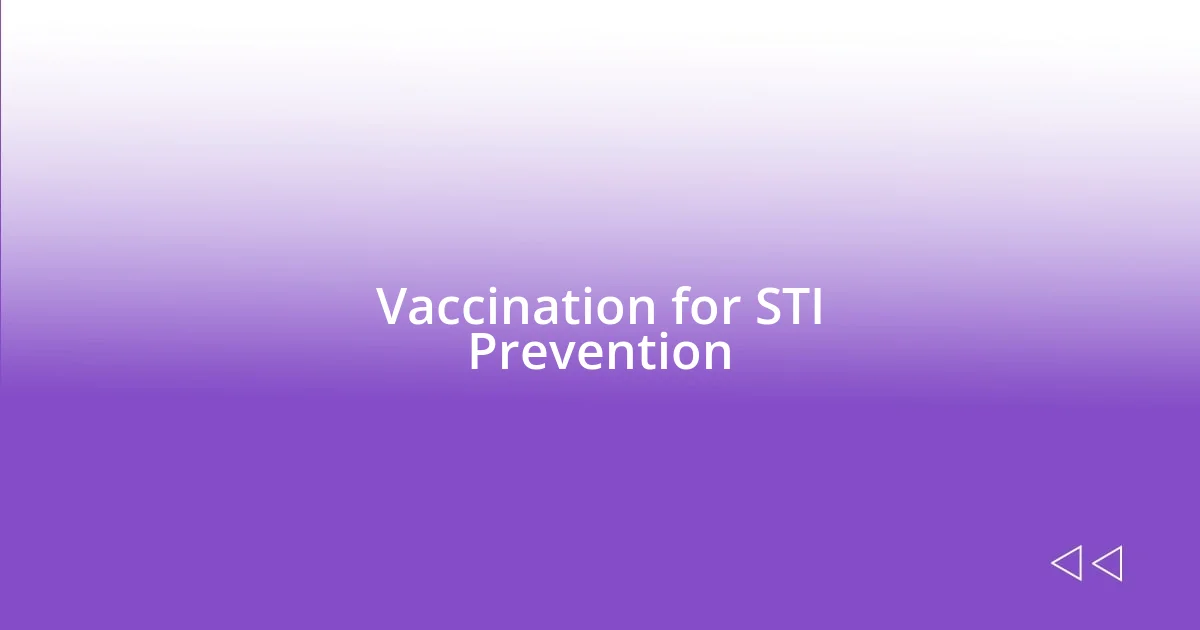
Vaccination for STI Prevention
Vaccination is an essential part of my strategy for preventing STIs, particularly for diseases like HPV and hepatitis B. I vividly remember the day I completed my HPV vaccination series. The sense of relief I felt, knowing I was significantly reducing my risk of cervical cancer and other HPV-related health issues, was enormous. Have you ever experienced that moment of empowerment from taking a proactive step for your health? It’s a simple, preventative measure that can have profound long-term benefits, and I truly believe more people should be aware of it.
Equally significant is my experience with the hepatitis B vaccine. I opted for this vaccine before traveling abroad, understanding that some regions have higher transmission rates. I still recall the conversation with my healthcare provider, who reassured me that getting vaccinated was one of the best decisions I could make. The value of that peace of mind during my travels was immeasurable. Isn’t it comforting to know that you’ve taken steps to safeguard your health? Vaccination offers that assurance, and it shouldn’t be overlooked in our discussions about STI prevention.
Whenever I share this piece of my health journey, I encourage friends to consider their vaccination options seriously. It feels like a small step with a huge impact. I’ve often wondered why more people hesitate to get vaccinated when it’s such an effective form of protection. Perhaps it’s a lack of information or uncertainty about its importance. For me, getting vaccinated has become a priority—an investment in my health that allows me to engage more confidently in my relationships. What about you? Have you thought about how vaccination could play a role in your health plan?
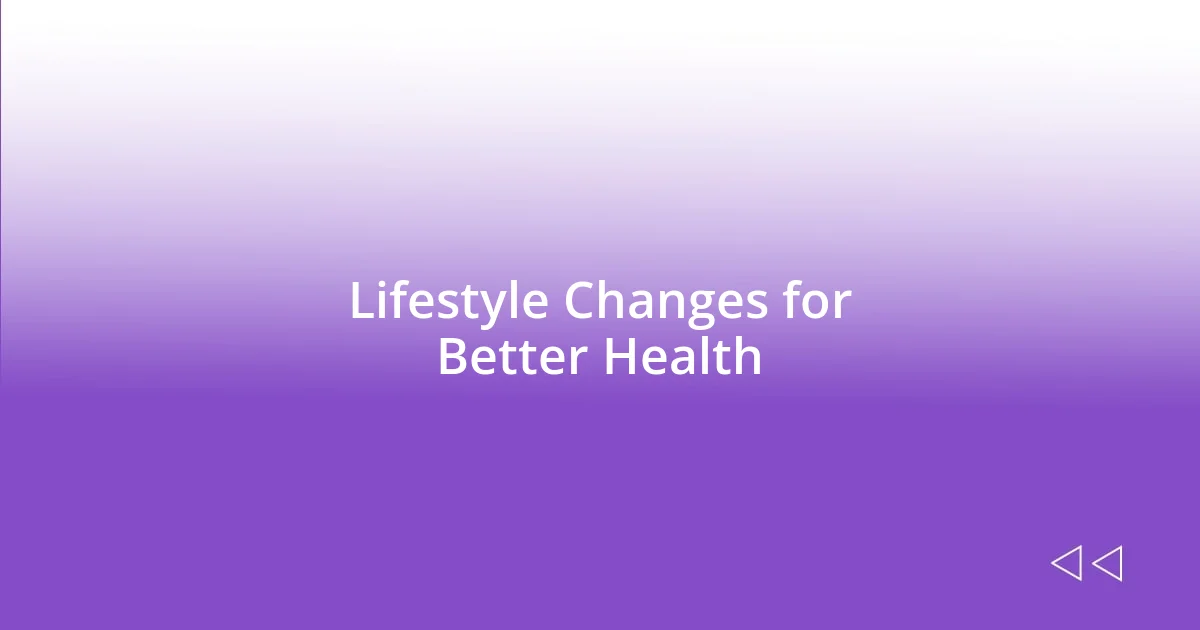
Lifestyle Changes for Better Health
Making lifestyle changes has been transformative for my overall health, particularly in preventing STIs. One significant shift I made was incorporating regular exercise into my routine. I remember the initial days of feeling reluctant, but once I started, I discovered how invigorating it felt to stay active. Have you ever experienced that rush of endorphins after a workout? It not only boosts your mood but also supports a healthier immune system, which can be crucial in fending off infections.
Nutrition plays a fundamental role too. Mindfully changing my diet to include more fruits and vegetables made a noticeable difference. I can recall a time when I indulged in too many sugary snacks and felt run down. After embracing a balanced diet rich in vitamins, I noticed not just physical improvements but also a shift in my energy levels. Isn’t it amazing how what we put into our bodies reflects on our overall well-being? Choosing nutrient-dense foods contributes to a stronger body and mind.
Lastly, I’ve realized that reducing stress is essential. I began practicing mindfulness and meditation, and it’s become a vital part of my daily life. Reflecting on moments of anxiety, those practices helped ground me. Isn’t it enlightening to see how relaxation techniques can impact your health? This shift has not only improved my mental clarity but also strengthened my physical resilience, helping me approach life with a sense of calm and positivity.














